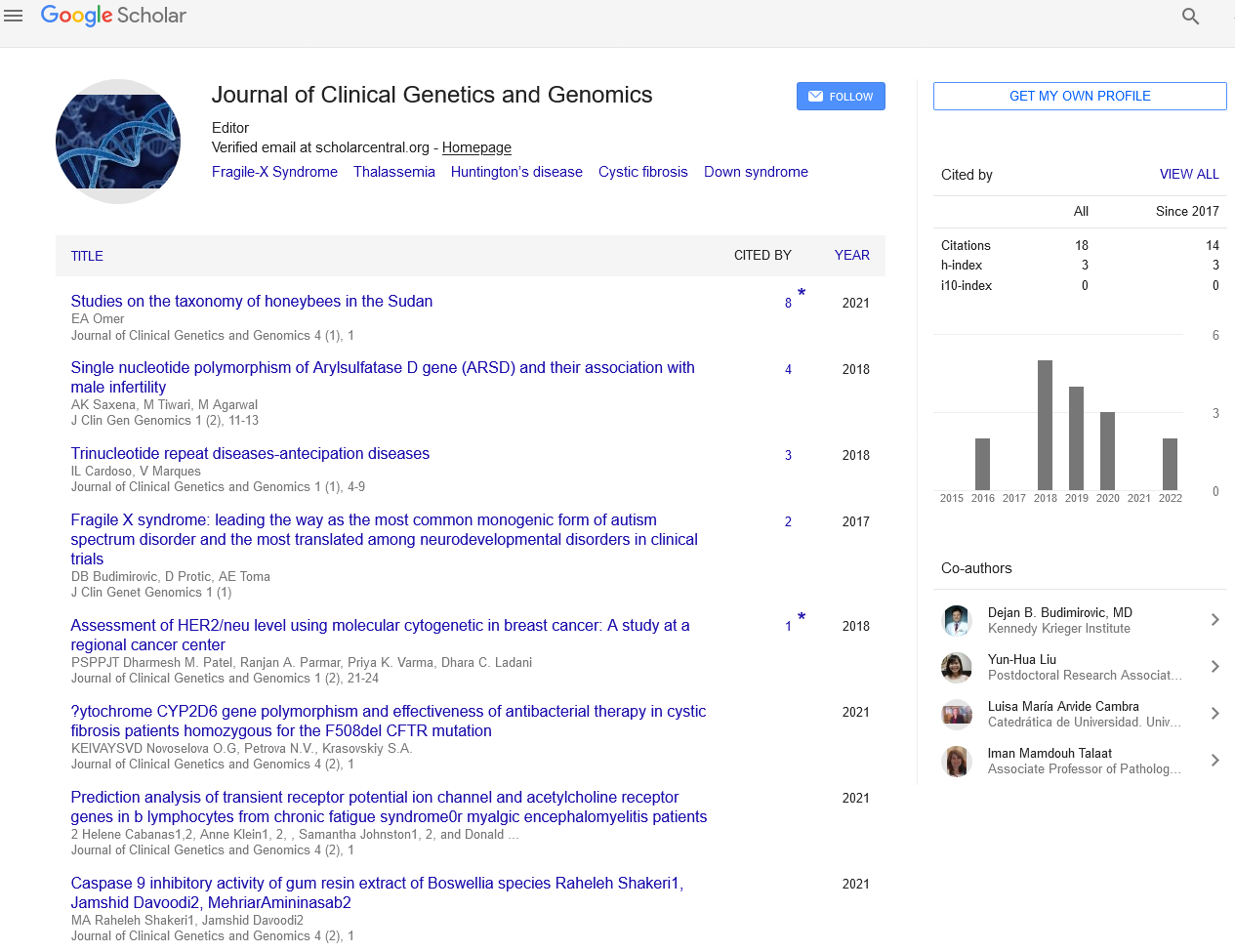Male infertility: An Important Factor That Is Easily Ignored Is the Microbiome
Received: 06-Jun-2022, Manuscript No. PULJCGG-22-5984; Editor assigned: 08-Jun-2022, Pre QC No. PULJCGG-22-5984 (PQ); Accepted Date: Jun 17, 2022; Reviewed: 12-Jun-2022 QC No. PULJCGG-22-5984 (Q); Revised: 15-Jun-2022, Manuscript No. PULJCGG-22-5984 (R); Published: 20-Jun-2022, DOI: 10.37532/puljcgg.22.5(3) 1-2
Citation: Koontz D . Male infertility: An important factor that is easily ignored is the microbiome J. Clin. Genet. Genom. 2022;5(3):1-2.
This open-access article is distributed under the terms of the Creative Commons Attribution Non-Commercial License (CC BY-NC) (http://creativecommons.org/licenses/by-nc/4.0/), which permits reuse, distribution and reproduction of the article, provided that the original work is properly cited and the reuse is restricted to noncommercial purposes. For commercial reuse, contact reprints@pulsus.com
Abstract
Reproduction has long been of interest to humans. Over 72 million people worldwide are thought to be affected by infertility, which is caused to a large extent by male factors—roughly 50% of the time. About 30% of male infertility is still believed to be idiopathic, despite improvements in the diagnosis, medical care, and psychosocial management of male infertility over the previous few decades. The roles and mechanisms of the microbiome are still unclear, although recent developments in the microbiome related to male infertility suggest that the microbiome may be a crucial component in the therapy of male infertility. Here, we focused primarily on the links between microbial genital infection and male infertility, the impact of antimicrobial therapy on male reproduction, the link between microbial dysbiosis and male infertility, and the impact of probiotic intervention on male reproduction. This review addressed the function of the microbiome in male infertility and advanced our understanding of the association between the microbiome and male infertility. We demand more thorough research on the connection between microorganisms and male infertility, and we vehemently advocate raising awareness of microbial illness and/or microbial dysbiosis among sterile males seeking fertility assistance.
Key Words
Infertility; Microorganism; Antimicrobial; Probiotic; Multilineage
Introduction
In fertility is defined as the inability to conceive in couples who have engaged in regular sexual activity for more than a year without the use of contraception. It is considered to be a serious global public health concern. Although infertility is an emotional, social, and financial burden, suitable treatments aimed at preventing and treating it are frequently unavailable, prohibitively expensive, or nonexistent. Male infertility has received far too little attention in comparison to female infertility.
The global drop in sperm parameters is a hotly debated subject. The results of the manuscripts were inconsistent, with some research demonstrating a trend toward declining semen quality and others not. According to a systematic assessment, between 1973 and 2011, sperm counts in western countries fell by 50%–60%, and almost onethird of cases were still idiopathic.
The results of another study's retrospective analysis of 119,972 men's total motile sperm count changes over the previous 16 years showed a 10% reduction. 4,867 young males in Copenhagen, Denmark, exhibited an increasing trend in sperm concentration and total sperm count. Recent high-quality research has indicated that there is a drop in sperm parameters and has suggested plausible explanations for this decline in sperm parameters, such as obesity, food, and environmental pollutants, despite the fact that the decline in male fertility continues unabatedly. Over the past few decades, numerous efforts have been undertaken to pinpoint the underlying reasons for infertility in men and create fresh strategies for treating it. However, there are currently few treatments that can effectively stop the progression of idiopathic
One of the most active study areas of our day is focused on the human microbiome. The reproductive canal, oral cavity, and gastrointestinal tract are just a few examples of exterior cavities where millions of different species of bacteria can be found. This microscopic ecosystem is known as the microbiome. Recent advancements in DNA sequence data collection and analysis technology allow for a far richer understanding of the varied human microbiome. Scientists frequently face difficulties classifying and comprehending the human microbiome's complicated composition and effects on health.
The male reproductive system microbiota has not been extensively documented for many years as a result of the "culture-negative" status of male reproductive tract samples in microbiological testing being originally thought to be free of microbial illness. However, new research has revealed that the healthy male reproductive tract and its bodily fluids, including seminal fluid and urine, do in fact contain a microbiome. Correlations between the human microbiome and semen parameters and fertility have gradually been discovered as 16S ribosomal RNA sequencing has been applied to the microbiomes of infertile males, which may be one of the key reasons why this disease has been so difficult to diagnose in the clinic for so many years and is reluctantly referred to as "idiopathic male infertility." The use of probiotic supplements to alter the microbiota has gained popularity. It is generally recognised that probiotics and their byproducts can change the makeup of the human microbiome, which has an additional impact on the body's metabolism and health. The impact of the microbiota and probiotics on male infertility is receiving more interest since probiotic-based treatments may improve the host's microbial balance. As a result, there has been a sharp rise in research interest in the potential of probiotics to influence the microbiome linked to male infertility.
A current understanding of the microbiome's possible implications on male infertility was the aim of this review. The association between microbial infection in the genital tract and male infertility as well as the impact of antimicrobial therapy on male reproduction, the association between microbial dysbiosis and male infertility as well as the impact of probiotic intervention on male reproduction, and the limitations of current research as well as recommendations for future research were the three main topics covered in this review.





